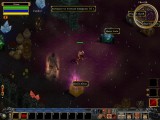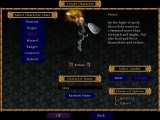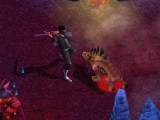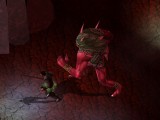Overall Score 94%
|
Din's Curse
I stood before a giant figure, his voice booming out as if from everywhere at once. This was the god Din, and I now belonged to him. Din told me that my life had been wasted, that I had spent my time on cheap thrills and selfish hedonism, and now my soul must be redeemed. I would serve him until he was satisfied my penance had been paid. I looked around, to find myself in a strange new town, the people living in fear. There were monsters in the caverns beneath us, and they were stirring. I was to be this town's hero. I would face the hordes and save the people. Maybe then Din would release me from his service...
This isn't the first time Soldak Entertainment have submitted a game to Bytten. Kivi's Underworld did rather well a little over a year ago when I awarded it a well deserved gold star, and I was instantly intrigued on hearing about a follow-up. Din's Curse uses the same settings, monsters, abilities and so on as Kivi, but whereas the previous game features a set of fixed quests and a fairly uniform progression, Din's Curse is much more freeform. Every "world" is a randomly generated town and dungeon, and you receive various quests that take you into the depths. The most intriguing aspect of the game is that your actions - or lack of them - lead to consequences. If you don't go and rescue that trapped NPC, they're going to die. If you don't go and fight the big bad boss monster, they'll start uprisings and build things that will cause you bigger headaches (I particularly liked the idea of an earthquake machine!). Occasionally monsters come up to the surface and attack the town, requiring you to come to its defence, and this is just one of the ways that delaying the battle can cost you. Dying is not permanent for you, but if the steward, warmaster and apothecary are all killed and/or incapacitated, the town is lost.
Gameplay can be operated entirely by mouse, though various keyboard controls are also available that can save a lot of hassle (especially for your special skills). The left mouse button is your primary control, telling your hero where to walk and operating all manner of items depending on context (talk to NPCs, attack monsters, open doors and so on). The right mouse button is used to operate your special attacks, such as more powerful sword strikes or spellcasting. You also have a number of other skills that can be upgraded as you level up, and these can be operated by rght-clicking on the numbered slots along the bottom or with the equivalent number key on the keyboard. A set of buttons also opens up your inventory, character sheet, the bestiary, the level map, the game options and so on, and in these screens you can use left and right clicks as detailed. When managing your inventory, left clicks pick up/drop objects and right clicks equip or identify them. Dropped items are clearly labelled and can be picked up with the left mouse button (assuming you have space to carry them).
The controls are very intuitive, and the basic move/use/fight/special controls are exactly like they are in Kivi's Underworld, so players of that game will already be well away when they enter their first dungeon. This is good, as the rest of the concepts are initially overwhelming. Ingame help pops up for new players whenever they try something for the first time, but this tended to lead to a row of four or five blinking help symbols on my screen and a bit of confusion about what they were on about. There is a very real sense of information overload when first starting out and I didn't understand half of what I was told on my first game. It wasn't until I started again that I managed to figure out what everything was - the old adage applies of "show, don't tell". I learned far more easily by doing stuff and learning what things did. Perhaps a tutorial dungeon/town set, in which a limited set of options is given, might help in this regard.
Players of Kivi's Underworld will know exactly what the graphics look like here. They are pretty much identical, which is to say the same top quality. A minor quibble is the way corpses can sometimes clip badly against walls but this is understandably difficult to prevent! One minor touch I noticed and was very impressed by was the way dropped items don't just appear but actually fall from the body, and they each look different. Lighting effects are brilliant - burning barrels are a great way to temporarily light a dark room - and everything runs very smoothly. I had a few moments where everything slowed down due to a lot of CPU activity at once, but it remained smooth and playable even then. Caverns are varied in style from one world to the next and are filled with atmospheric touches, such as the spiders that run across the floor and the flies that buzz around corpses.
As well as a myriad of sound effects (everything from a variety of monster growls to the clink of coins, the different sounds that items make when dropped, the glug of potions, fiery explosions and even cries of "over here!" when you're getting near someone needing rescuing) there is a selection of music. Din's Curse has a somewhat unusual approach to music, however; rather than continuous background noise, key tracks are triggered by events. Attacked by orcs? Things bursting into flame? A sting of dramatic music strikes up whenever some form of peril is afoot.
The playability for Din's Curse is pitched very well. Even a basic Level 1 character can head straight into the dungeon and start hacking the enemy to pieces, and it really doesn't matter what you equip them with at first. As you level up, the monsters get nastier; the lower levels of the dungeon can also be dangerous and a powerful boss monster can kill your character quite easily. It pays to keep an eye out for better armour, better weapons and so on. While this may sound like a cautious approach is best, the dynamic plot development actually makes this a good way to lose - you'll die less often, but by the time you get to the boss monster he'll have set up three altars, started four uprisings and ransacked the town. He who hesitates is indeed lost. Death is not permanent for your character - if you die, you respawn back in town with an experience debt to make up. If the town is lost, you can simply start a new one. There are options to make new worlds easier or harder to suit your tastes, and masochistic players after a real challenge can even make death permanent, or have monsters start several levels higher than their own character.
Other clever features include two chests in every town - one is your player stash, where you can store things you might want to keep, and this stash is carried between towns. The other chest is a shared stash, which can be accessed by all your characters. Higher level characters finding lots of higher level equipment can thus pass them on to weaker characters and give them a boost, and while that Ego Flatbow may be useless to your wizard or warrior, you can pass it on to your Ranger through this method (and they can pass on any useful items they may have found). There's also a multiplayer option, in which characters can work together to complete quests. The random nature of the game means that you never get the same experience twice, though is it possible to eventually win through and gain Din's favour.
I have a few minor niggles, though it is curious that Soldak have identified and countered a few before I even started playing! It is too easy sometimes to click on a gate or an item, or just scoot down the corridor, rather than attack that enemy; but you can hold down Ctrl to stop moving while fighting. Sometimes the objects can be hard to spot and sometimes the item text gets in the way; you can press Alt to toggle labels on and off. Ultimately there are only two moderately large things going against Din's Curse - the swamping of new players with masses of information they cannot digest, and the way that random quests can eventually become quite samey. Once you have a high level character with stacks of rare equipment, quests become something of a grind - find this, rescue X, kill Y, and so on. Still, it takes quite a while before you get to that point!
On the other hand, Din's Curse scores highly by a very important standard of mine - I've become somewhat addicted to it. The autosaving of characters means I can spend a spare twenty minutes or a few hours on it (often, I intend one and end up with the other). New quests can keep appearing, so I always want to go back and deal with just one more. This has made this review remarkably difficult to write! Well done, Soldak - this gold star is well deserved!
Keywords: din's curse review, soldak entertainment reviews, soldak entertainment games, din's curse scores, pc game reviews, indie game reviews, independent gaming.
|



